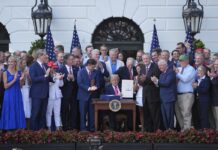
INDIANAPOLIS (GA Recorder) — Former Vice President Mike Pence defended Georgia’s elections in a speech Wednesday morning — days after former president Donald Trump was indicted in that state — even as he denounced what he framed as politically motivated attacks on his former boss.
“Despite what the former president and his allies have said — for more than two-and-a-half years, and continue to insist at this very hour — the Georgia election was not stolen, and I had no right to overturn the election,” Pence said.
Pence, who spoke during the National Conference of State Legislatures summit in Indianapolis, also announced a new states’ rights-focused campaign platform.
During an audience question-and-answer session, he further reassured an Alaska Republican that he’d “never allow Washington, D.C. to intrude on the conduct and certification of (presidential) elections.”
But Pence also criticized the handling of Trump’s actions.
“I’ve said many times (that) I’d hoped the judgment about those days would be left to the American people. Such is not the case,” Pence said of the Georgia investigation into 2020 election interference.
Georgia prosecutors on Monday charged Trump and 18 allies with a racketeering statute usually used on mobsters, the Georgia Recorder reported.
And Pence criticized the federal justice system as “politicized,” arguing that Democrats in Washington, D.C. had engaged in “ongoing pursuit of the former president” but “seem to look the other way (as) Hillary Clinton (and) Hunter Biden undermine public confidence in equal treatment under the law.”
Bringing back federalism
Pence took advantage of his audience — largely state lawmakers and staff — to announce his campaign’s third policy platform: federalism.
The term refers to how the federal and state governments divide and share power, according to Congress’ Constitution-focused website.
“As a former governor, I know that states are not subsidiaries of Washington, D.C. States are not subordinate departments of the federal government,” Pence said. “Our 50 states are the very foundation of our Republic.”
“When states are free, America thrives,” he added.
Pence’s five-part plan generally limits the federal government’s powers in favor of the states.
- The plan starts with eliminating the federal Department of Education, and sending educational funds directly to the states. Pence has long been an advocate of “school choice,” or education strategies that allow parents to enroll their children in schools other than their assigned district public schools, often using public funding.
- Pence also advocated to repeal the Affordable Care Act, better known as Obamacare. The plan would divert federal dollars currently spent on low-income health care services and on insurance subsidies toward the states.
- The federal government owns 28% of U.S. land, according to a 2020 Congressional Research Service report, and Pence wants to change that. He said that “a portion of” the land should be returned to the states for “development” and “innovation.”
- The plan also calls on the states to take over all social safety net programs currently administered by the federal government, and the money involved similarly turned into grants to states.
- The plan concludes with a push to reform the federal highway trust fund, similarly to states’ benefit.
“Under any administration I lead, any regulation that imposes unfunded mandates on the states will be prohibited from day one,” Pence added, to applause. “In my administration, if Washington calls the tune, Washington will pay the bill.”
The federalism plan comes on the heels of plans for the nation’s economy and energy.
On the debate stage next week
Pence is among a crowded field of Republicans challenging Trump for the 2024 presidential nomination. He has struggled to gain traction, polling consistently in the 5% range, according to a FiveThirtyEight compilation of national polls.
He said Wednesday that he was grateful to qualify for the Republican presidential debate next week in Milwaukee. That required a certain polling threshold and donor minimum.
And Pence indicated that he’s shedding his staid vice presidential persona.
“I’m well-known, but I don’t think I’m known well,” Pence said, recounting how, as second-in-command, he prayed daily “not to be the story.”
“I hope in that debate, people maybe get to know me a little bit better,” he said.
Trump, meanwhile, has said he won’t sign a pledge, required of all participants, to support the GOP’s eventual nominee.
“I hope he comes, I really do,” Pence said. “I always answer (reporters) the same way: I’ve debated Donald Trump a thousand times — just not with the cameras on. … I hope this is the beginning of a vigorous debate about the future of our country.”






